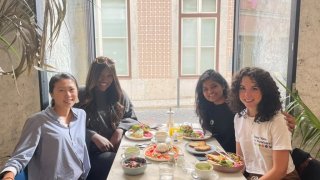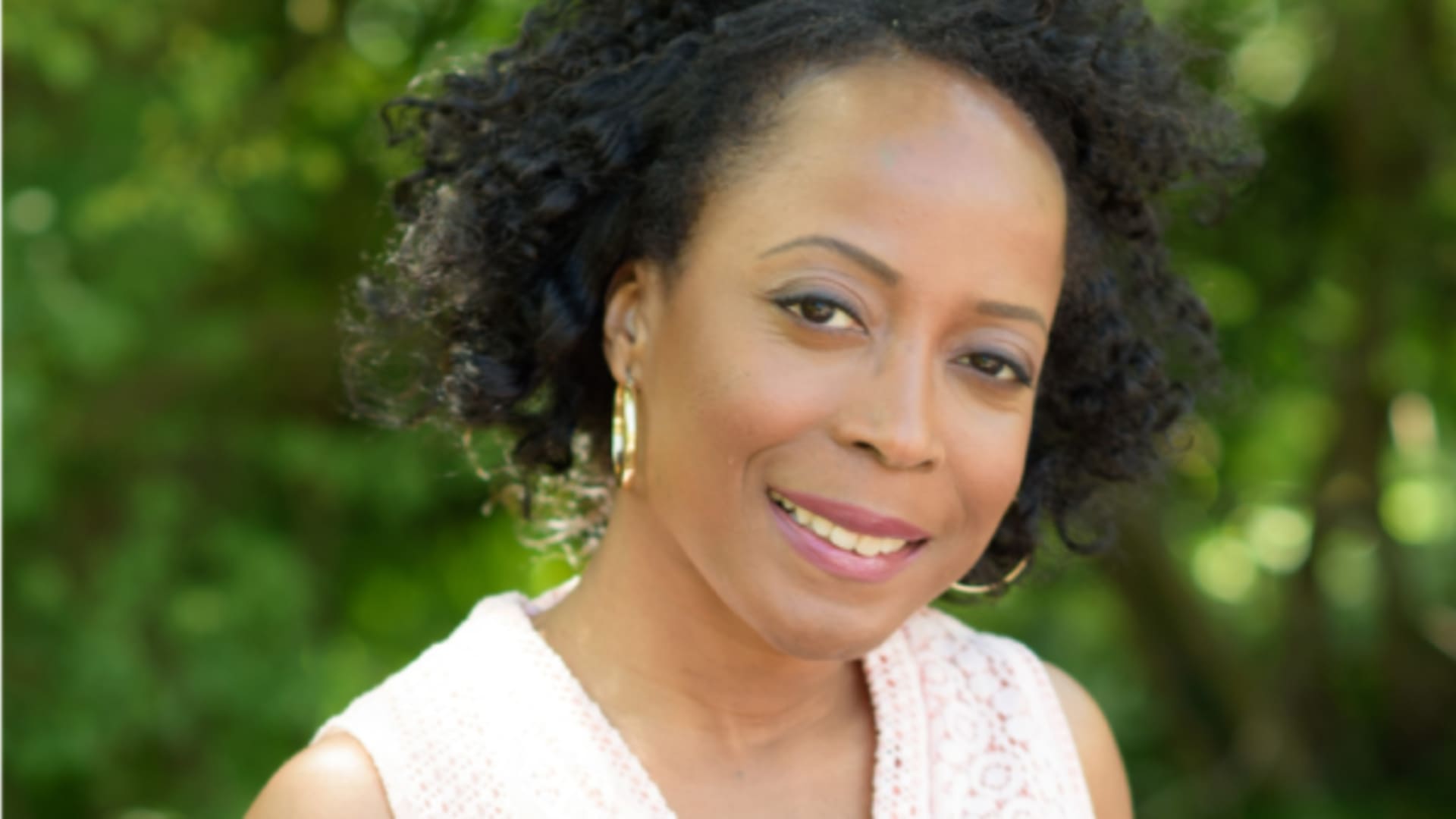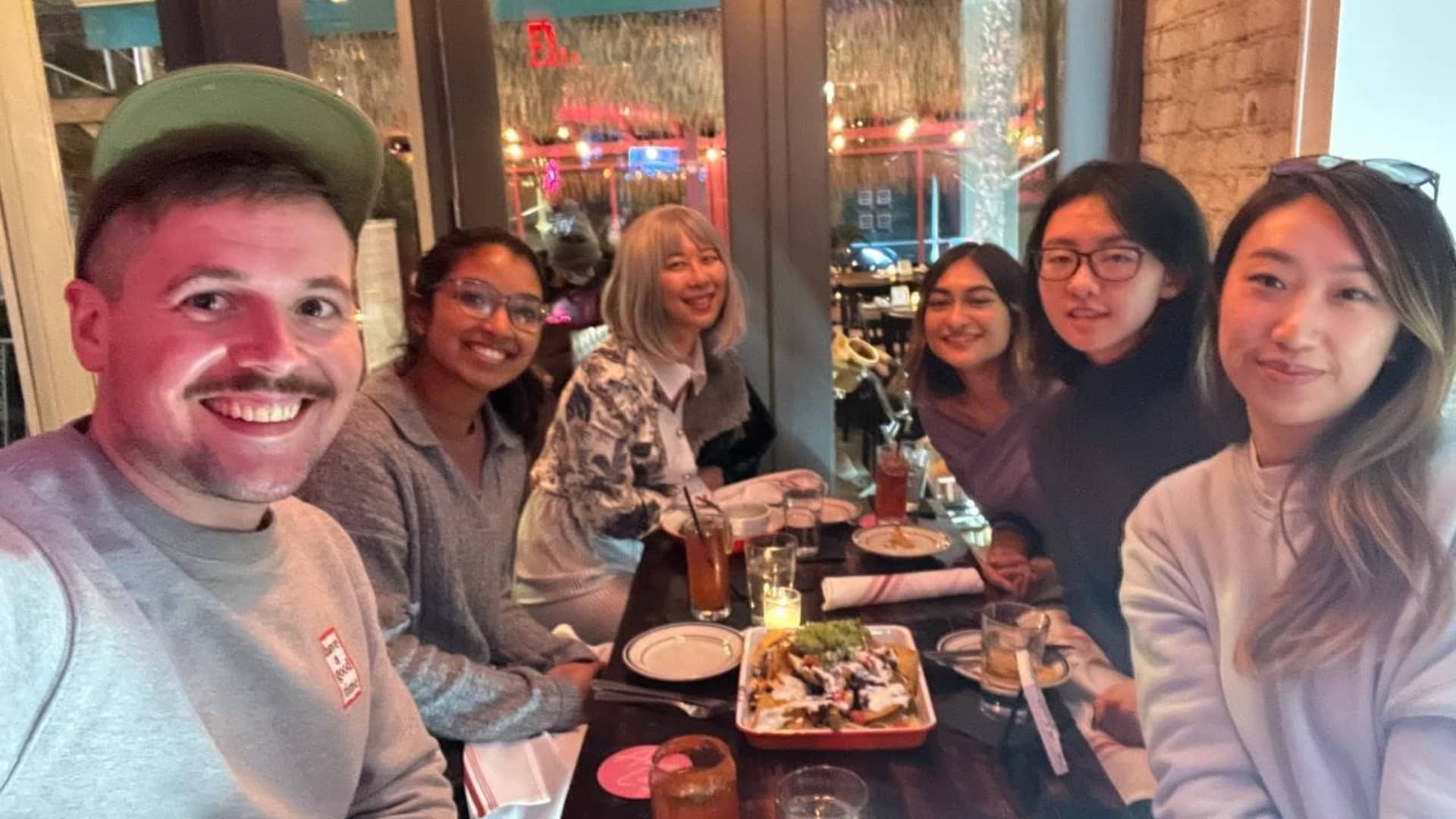
Olayinka Odeniran founded the Black Women Blockchain Council (BWBC) in 2018 after attending the North American Bitcoin Conference in Miami that year.
There, just three of 88 speakers were women, with the rest being mostly white men. Its so-called "networking party" was held at a strip club, where several women felt uncomfortable and disappointed.
After experiencing that, "women in the space basically said that they had enough," Odeniran tells CNBC Make It. "Instead of complaining, we decided to band together and create our own community within each other."
Though it was incredibly exciting to build a support system of women in crypto, "I started to look around, and I was seeing only a handful of people that look like me. So, I started seeking out other Black women in this space," she says. Odeniran has since invested in onboarding Black women to the space through the BWBC. The global benefit LLC provides Black women around the world with educational resources to understand blockchain and build wealth.
Get top local stories in Southern California delivered to you every morning. Sign up for NBC LA's News Headlines newsletter.

In July 2021, the BWBC partnered with notable Ethereum software company ConsenSys to launch an online program to train half a million Black women globally to become blockchain developers by 2030. The initiative will roll out in the third quarter of 2022, Odeniran says.
"We want to show representation and show that this space is not just male dominated," she says. "There's a lot more women in this. We're doing a lot of great things."
Money Report
Odeniran isn't alone in this mission. Alongside her and the BWBC, there are other women-led crypto organizations aiming to promote diversity in the space. This includes non-profit Women in Blockchain (WiB) and decentralized autonomous organizations (DAOs) like the Komorebi Collective, among many others.
'There's a problem with highlighting women that are already in the space'
Odeniran first learned about bitcoin in 2016 while working as a chief compliance officer at a financial firm. While she was first skeptical of it, Odeniran became more interested in the technology after researching more and reading its white paper: "I felt that as a woman in the Black community, blockchain was something that could definitely help us," she says.
She also mentions the importance of being able to trace transactions on the blockchain, especially in places like Africa where people are hedging against currency devaluation and theft.
Manasi Vora, founder of WiB, would agree.
In 2016, Vora came across bitcoin after researching monetary policy. Though she had been working in traditional finance at a bank, her interest in the topic came after prime minister Narendra Modi banned most of India's currency notes, devaluing it almost overnight.
"That sent a lot of shockwaves across the Indian economy," Vora says. "The marginalized population was affected the most. And that was a pivotal moment where I started thinking about money."
Following that, she fell down the bitcoin "rabbit hole." Though she found the space promising, Vora often noticed that she was one of few women in a room of hundreds of men at industry conferences.

"On one hand, there was this narrative back then that crypto is going to change the financial world. But on the other hand, I was seeing the same systemic biases from traditional finance playing out in crypto, where there wasn't really enough diversity in the decision-making room," Vora says.
In 2017, Vora left her job to pursue crypto full-time, launching WiB, an organization focused on increasing diversity in the crypto space. Through WiB, Vora hopes to break down barriers to entry in crypto by providing educational resources.
Additionally, Vora is passionate about funding women and nonbinary founders in crypto, which led her to co-create the Komorebi Collective DAO in 2021. Its purpose is to invest in start-ups and projects led by women and nonbinary creators.
In theory, a DAO is a blockchain-based collective that isn't governed by one person or entity. Instead, its rules and governance are coded in smart contracts and cannot be changed unless voted upon by the DAO's members. Though many have popped up recently, DAOs can be risky bets, with many safety and legal unknowns to be worked out.
Vora and WiB partnered with she256, a nonprofit that also aims to increase diversity in crypto, and Kinjal Shah, a partner at VC Blockchain Capital, to create the Komorebi Collective as an investment DAO.
"Inclusivity needs to be a larger part of the discussion, earlier on in the conversation in crypto," Shah says. "I'm particularly conscious of creating safe spaces and communities for anyone to be able to participate. My hope is that Komorebi can be a part of this change."

Medha Kothari, co-founder of she256, feels the same.
"We [are] convinced that blockchain technology [is] going to fundamentally change the way our financial systems run and our societies are governed," she says. "So, we thought it was absolutely critical that those building these systems represent the diversity of our global population."
To be a member of the DAO, folks had to invest $5,000 each. As members, each have voting power in choosing which crypto founders to invest in. So far, the DAO has raised $400,000 to invest, Vora says. Of that, they've invested about 65% in companies across the globe. They hope to raise more in the near future.
Vora declined to disclose which crypto companies the Komorebi Collective has invested in, adding that many aren't public yet. But, she did mention that two are in the decentralized finance (DeFi) ecosystem, involving lending and saving, while others include an NFT marketplace and a company focusing on wealth building for women in crypto. Vora and Shah are seasoned investors in the space. When it comes to investing in DeFi projects or NFTs, financial experts recommend being careful, understanding the risks and taking time to research before buying in.
"There is a diversity problem that needs to be solved in crypto and organizations like ours are bridging that gap," Vora says. "But I also think there's a problem with just highlighting women that are already in the space."
Through the Komorebi Collective, Vora and her co-creators have one main goal: "Get a group of really badass female founders, builders and investors in this space to come together and pool capital or knowledge and make a difference while earning returns," she says.
'I'm doing this for my daughter'
Ultimately, blockchain alone isn't enough to create a better, more inclusive financial system, Vora and Shah say.
"At the end of the day it's about tangible change," Shah says. "Crypto is predicated on a world that is decentralized, with an emphasis on accessibility. Transactions are meant to be cheaper, in theory, with investors getting access to opportunities much earlier."
But the space isn't quite there yet — high transaction fees, volatility and other hurdles still cause barrier to entry. "Crypto is not going to realize this reality by default. It needs to be a conscious consideration that is built with intentionality," she says.

To Vora, crypto has the potential to "break poverty cycles," she says, "but it has to be done right. Just building these technical tools doesn't solve all the problems."
Instead, it's about getting the technology in the hands of those historically and systemically underserved in the U.S. and across the globe, she says, which is what WiB and other organizations are attempting to bridge.
"I have a 12-year-old daughter, and I'm doing this for her," Odeniran says. "I want her to have opportunities that are fair and see people, see other Black girls, that look like her, and feel comfortable. I really think that's what this technology is affording us: To create a world where everybody is included."
Sign up now: Get smarter about your money and career with our weekly newsletter
Don't miss:
- 'I had $10 in my bank account': This 36-year-old went from living paycheck to paycheck to making over $109,000 selling NFTs
- This 29-year-old launched a business to support Black NFT artists—and it made $140,000 in 10 months: I see it as a way to 'rebalance power'
- This mom quit her job to focus on crypto full time and build 'generational wealth.' Now she makes around $80,000 per month






